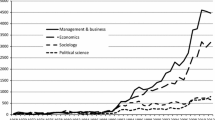Abstract
Concerned about the prevailing view of Max Weber with the bias of intellectualism, the author explores the possibility of an evolutionary reading of Weber. He finds that an evolutionary scheme is conceivable in Weber’s discussion of diversified concepts of ‘rationality.’ Though Weber rejected evolutionism with the reason that ‘selection’ cannot explain the emergence of new social relations, Weber’s entire work forms an evolutionary view of world history based on the interaction of economy and culture. However, an idealistic value theory in addition to the lack of ‘population thinking’ hindered Weber from becoming an evolutionary scholar. The author believes that an evolutionary reading of Weber has an advantage also in the reappraisal of ‘Marx and/or Weber’ discussions.
Similar content being viewed by others
References
Andersen E. S. (1994) Evolutionary Economics: post-Schumpeterian contributions. Pinter: New York and London.
Barshay, A. E. (2004) The Social Sciences in Modern Japan: The Marxian and Modernist Tradition. University of California Press: Berkley, Los Angels, London.
Boudon, R. (1997) “The Present Relevance of Max Weber’s Wertrationalität (Value Rationality),” in Koslowski ed. (1997).
- (2001) The Origin of Values: Sociology and Philosophy of Beliefs. Transaction Publisher: New Brunswick (USA) and London (UK).
Elster, J. (2000) “Rationality, Economy, and Society,” in Turner ed. (2000).
Granovetter, M. (1985) “Economic Action and Social Structure: The Problem of Embeddedness.” American Journal of Sociology, 91.
Kelly, A. (1981) The Descent of Darwin: The Popularization of Darwinism in Germany, 1860–1914. University of North Carolina Press: Chapell Hill, NC.
Koslowski, P. ed. (1997) Methodology of the Social Sciences, Ethics, and Economics in the Newer Historical School. Springer: Berlin, Heidelberg.
Lövith, Karl (1932) “Max Weber und Karl Marx.” Archiv für Sozialwissenschaft und Sozialpolitik, Bd. 67.
Mayr, E. (1988) Toward a New Philosophy of Biology: Observations of an Evolutionist. Belknap Press of Harvard University Press: Cambridge MS.
Menger, C. (1883) Untersuchungen über die Methode der Socialwissenschaften, und der politischen Oekonomie insbesondere. Duncker & Humblot: Leipzig.
Mommsen, W. J and Schwentker W. eds. (1999) Max Weber and das Moderne Japan. Vandenhoeck & Ruprechti Göttingen.
Orihara, H. (1999) “Max Webers Beitrag zum Grundriss der Sozialökonomik: Das Vorkriegsmanuskript als ein integriertes Ganzes.” Kölner Zeitschrift für Soziologie und Sozialpsychologie, 51.
Parsons, T. (1937) Structure of Social Action. MacGrow-Hill: New York.
Runciman, W. G. (2001) “Was Max Weber a Selectionist in Spite of Himself?” Journal of Classical Sociology, 1(1).
Schluchter, W. (1998) “Max Webers Beitrag zum Grundriss der Sozialökonomik: Editionsprobleme und Editionsstrategieen.” Kölner Zeitschrift für Soziologie und Sozialpsychologie, 50.
- (2000) “Psychophysics and culture,” in Turner ed. (2000).
Schumpeter, J. A. (1911) Theorie der wirtschaftlicher Entwicklung. Duncker & Humblot: Leipzig.
Schwendker, W. (1998) Max Weber in Japan: eine Untersuchung zur Wirkungsgeschichte 1905–1995. Mohr-Siebeck: Tübingen.
Shionoya, Y. (2006) “Schmoller and Modern Economic Sociology,” Schmollers Jahrbuch, 126 Jg., Heft 2.
- ed. (2001) The German Historical School: The historical and ethical approach to economics. Routledge: London and New York.
Swedberg, R. (1998) Max Weber and the Idea of Economic Sociology. Princeton University Press.
- and Smelser, N. eds. (1994) The Handbook of Economic Sociology. Princeton and New York: Princeton University Press.
Sumiya, K. (1999) “Karl Marx und Max Weber: Sichtweisen der japanischen Forschung,” in Mommsen and Schwentker eds. (1999).
Turner, S. ed. (2000) The Cambridge Companion to Weber. Cambridge University Press: Cambridge.
Uchida, Y. (1999) “Otsuka Hisao und Max Weber,” in Mommsen and Schwentker eds. (1999).
Weber, M. (1904; 1951) “Die «Objektivität» sozialwissenschaftlicher und sozialpolitischer Erkenntnis”. Archiv für Sozialwissenschaft und Sozialpolitik, Bd. 19. In Weber (1951), SS.146–214.
- (1904-05; 1920) “Protestantische Ethik und der «Geist» des Kapitalismus.” Archiv für Sozialwissenschaft und Sozialpolitik (Bd. XX u. XXI). Revised version in Gesammelte Aufsätze zur Religionssoziologie, Bd. I, 1920. J. C. B. Mohr (Paul Siebeck): Tübingen.
- (1908; 1924) “Methodologische Einleitung für die Erhebungen des Vereins für Sozialpolitik über Auslese und Anpassung (Berufswahlen und Berufsschicksal) der Arbeiterschaft der geschlossenen Grossindustrie.” In Gesammelte Aufsätze zur Soziologie und Sozialpolitik. J. C. B. Mohr (Paul Siebeck): Tübingen.
- (1913; 1951) “Über einige Kategorien der verstehenden Soziologie.” Logos, Bd. 4. In Weber (1951), SS.427–474.
- (1921; 1951) “Soziologische Grundbegriffe,” I. Teil Kap.I. Wirtschaft und Gesellschaft. In Weber (1951), SS.527–565.
- (1949) The Methodology of the Social Science. Translated and edited by E. A. Shils and H. A. Finch. The Free Press: Glencoe, Ill.
- (1951) Gesammelte Aufsätze zur Wissenschaftslehre. Zweite durchgesehene und ergänzte Auflage, besorgt von J. Winckelman. J. C. B. Morh (Paul Siebeck): Tübingen.
- (1958) The Protestant Ethic and the Spirit of Capitalism. Translated by T. Parsons, with a foreword by R. H. Tawney. Charles Scribner’s Sons: New York.
- (1978) Economy and Society: An Outline of Interpretative Sociology, edited by G. Roth and C. Wittich. University of California Press: Berkley, Los Angels, London.
- (1981) “Some Categories of Interpretative Sociology” (Translation of Weber (1921) by Edith Graber). The Sociological Quarterly, vol. 22. no.2.
Yagi, K. (1997) “Carl Menger and the Historicism in Economics,” in Koslowski ed. (1997).
- (2001) “Anonymous history in Austrian economic thought: From Carl Menger and Anton Menger to Friedrich von Wieser,” in Shionoya ed. (2001).
- (2005) “Karl Knies, Austrians, and Max Weber: a Heidelberg connection?” Journal of Economic Studies, vol. 32 (4).
Author information
Authors and Affiliations
Corresponding author
About this article
Cite this article
Yagi, K. Evolutionary Reading of Max Weber’s Economic Sociology—A Reappraisal of ‘Marx-Weber Problem’. Evolut Inst Econ Rev 3, 189–208 (2007). https://doi.org/10.14441/eier.3.189
Published:
Issue Date:
DOI: https://doi.org/10.14441/eier.3.189



